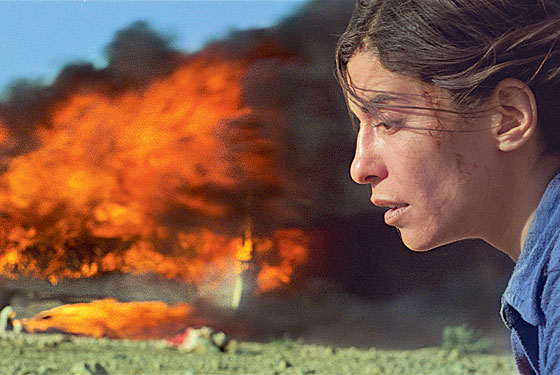
For two hours, Denis Villeneuve’s Incendies plays like an essentially realistic—and riveting—mystery. It’s a dual story: of French-Canadian brother-and-sister twins compelled by the will of their dead mother to locate a father they thought died decades earlier and a brother they never knew existed; and, in flashbacks, their mother’s early life, careering from bloody horror to bloody horror amid right-wing Christian militias massacring Muslims and Muslims massacring Christians right back. (The country goes unnamed but is obviously Lebanon.) Then, ten minutes from the end, there’s a preposterous turn, and Incendies stands revealed as a heavily symbolic piece of mythmaking, a threnody for a culture in which families are perverted by what one character calls “the merciless logic of reprisals.” The movie doesn’t quite jell, but you’ll feel its sting for hours.
Incendies is based on a play by Wajdi Mouawad, who fled Lebanon for France when he was 8, but you’d never guess the movie’s origins until those final scenes. Villeneuve has made it breathe onscreen, so that you feel as if you’re moving—like the twins, Jeanne (Mélissa Désormeaux-Poulin) and Simon (Maxim Gaudette)—through a maze, on the grimmest scavenger hunt ever. The life of the mother (Lubna Azabal) is a grisly snarl of atrocities in which every vengeful action produces an unequal and ungraphable reaction. Jeanne, thoroughly Westernized, teaches “pure mathematics”—but the new equation for their lives won’t and can’t add up.
Azabal’s performance is beyond my powers of description, her character bludgeoned to the point where her self-containment is a matter of survival. The movie contains one attack on a bus that builds to a hideous climax, and it’s rife with sexual assaults and the deaths of children. But Villeneuve’s handling of these scenes is subtle, nonexploitative. The opening, in which battered young boys have their heads shaved by what appears to be a Muslim militia, is set to Radiohead’s “You and Whose Army?” and ends with one boy staring balefully into the camera—a stare that eats into the mind. This is an extraordinary film.
The king of the anti-marketing marketers, Morgan Spurlock (Super Size Me), had a fun, wiseass idea for a documentary: to make a film about the ubiquity of paid onscreen product placements and finance it entirely with … product placements! In The Greatest Movie Ever Sold, he takes you behind the scenes as he exuberantly pitches potential sponsors, among them Pom Wonderful, JetBlue, Kao Brands (maker of Ban anti-perspirant), and a family-owned Pennsylvania convenience-store chain called—think of the possibilities—Sheetz. In between his mini-commercials for companies that buy in, Spurlock talks to both practitioners of the form (one with his own MRI machine to measure consumers’ brainwaves, another who’ll be marketing this very movie) and such anti-corporatist critics as Ralph Nader, Noam Chomsky, and Robert Weissman—who’d like to see a law forcing filmmakers to acknowledge paid placements with onscreen pop-up signs. (Good luck with that.) He also convinces the broke school system of Florida’s Broward County to let him advertise his movie on its property. As is his self-conscious wont, Spurlock ends by ruminating on whether he’s giving up his integrity even in this meta-context.
It’s surprising that The Greatest Movie Ever Sold plays so entertainingly, given that Spurlock’s quest is essentially beside the point. What he barely acknowledges—because it would kill this doc in the cradle—is that no heavyweight corporation wants to buy into a movie about product placement, because it’s meant to be stealth advertising. You’re not supposed to wonder why every hip character uses a MacBook or swills a Diet Coke. You’re supposed to assume that those are the products that cool people buy. The wink and the nudge break the trance.
And yet … I’ve always appreciated Pom Wonderful, and more so now that Spurlock has showed me how little actual pomegranate juice its competitors use; and just this morning I flew JetBlue (which currently screens a video hosted by Spurlock on the plane’s superior features) and felt very hip. I might switch to Ban because it was the first sponsor to sign on, and the next time I’m in Pennsylvania, I’ll look for a Sheetz, because Stan Sheetz is very funny when he asks if Spurlock is “blowing sunshine up [his] ass.” One of Spurlock’s interview subjects is critic Mark Crispin Miller, who has written brilliantly on the uses of irony in modern advertising to give the viewer a spurious sense of superiority. The idea doesn’t come up here, alas—but it’s why Spurlock’s sponsors got their money’s worth.
Incendies
Directed by Denis Villeneuve.
Sony Pictures Classics. R.
Pom Wonderful Presents: The Greatest Movie Ever Sold
Directed by Morgan Spurlock.
Sony Pictures Classics. PG-13.
E-mail: filmcritic@newyorkmag.com.
